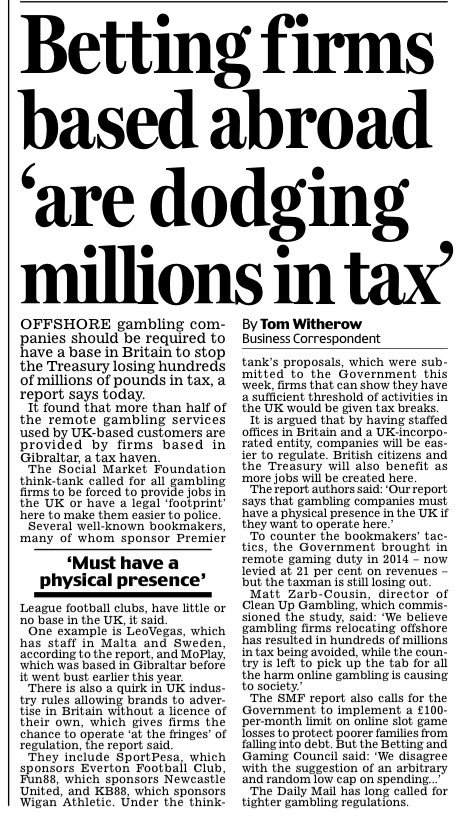
We can't afford not to!

Matt Zarb-Cousin
08/08/2020
This post originally appeared as Clean Up Gambling's update email, to subscribe click here.
In September last year, during an All Party Parliamentary Group on Gambling Harm evidence session, the CEOs and representatives of Britain's biggest betting firms (with the exception of GVC who were empty chaired in CEO Kenny Alexander's absence) were asked what they thought of imposing limits to stakes on content, such as slots or casino games online.
Apart from Phil Cronin, the chief executive of Tombola which already imposes a low maximum stake on its bingo platform, every other representative pushed back against the idea. The rationale, they claimed, was that the solution to player protection online lies in "affordability", rather than any restrictions on products.
Yet when these same representatives were asked to put a figure on an acceptable level of losses per month for a person on average salary, they refused, arguing the work hadn't yet been done.
Fast forward almost a year, and practically no progress at all has been made by the sector in implementing affordability checks that are actually effective. Affordability has only been spoken of in the abstract, cloaking the industry's opposition to effective harm reduction measures that could be enacted almost immediately, such as stake limits.
A generous explanation for the slow pace of reform might acknowledge that in order for harm reduction measures to be effective, they have to be enacted across the industry via regulation. It's no good if one operator does something effective that isn't required of another operator, as it would just lead to those experiencing harm to move to the less scrupulous firms. And coming up with an affordability model that works may take time.
Thankfully for the sector, the Social Market Foundation has done the heavy lifting for them. As featured in the Guardian, the Financial Times and the Telegraph, the influential think-tank suggested the rather ingenious idea of a £100 per month "soft cap" threshold on net deposits, requiring an affordability check to take place before someone wants to deposit more. All customer data would be held by a new gambling ombudsman, which would ensure gamblers couldn't exceed £100 across all licensed operators without first passing an affordability check, which the ombudsman would oversee.
Fantastic, right? The lowest income households would be protected from the financial consequences of gambling harm, the vast majority of gamblers deposit much less than £100 a month anyway so wouldn't be impacted, and those wanting to bet more who can afford to do so would not be restricted.
But the gambling industry didn't like it. Despite the SMF carrying out a rigorous analysis of household income data, the PR body representing the sector called the £100 soft cap "arbitrary" and appeared to push back on the notion someone's losses should be restricted in any form. This has understandably frustrated the report's author, Dr James Noyes (former advisor to then Labour deputy leader Tom Watson and previously director of policy at Respublica), who had engaged with gambling operators in good faith, hoping to accommodate them in the conversation around reform and on how an effective affordability model might work. Something industry executives had led many to believe they were serious about.
Judging by their reaction to a proposal from the SMF that would actually prevent harm, it appears this perceived seriousness was nothing short of a ruse. Instead of welcoming this policy idea - even as a contribution to the debate - they shifted gear, falling back on tired old tropes about the "nanny state". Dr Noyes articulates a rebuttal to this line of argument much more eloquently than I can, so I recommend you read his blog.
While other media outlets led on the issue of affordability, the Daily Mail picked up on the SMF's recommendation to crack down on gambling firms based offshore, avoiding tax in the process.

The Daily Mail followed up on what it's calling the "tax haven row", which will no doubt be of interest to policy-makers as Britain's post-Brexit economy starts to take shape.
Elsewhere I wrote for the Guardian in support of the SMF's recommendations, and on the cross-party consensus that's building for gambling reform, both in Parliament and in the country. As we told iNews, it's an issue that cuts across political lines but the demographic most receptive to gambling reform is Conservative voters who backed Brexit.
Clean Up Gambling does not believe the solution to the problems posed by online gambling is in prohibiting it. That's why we support effective regulation and consumer protection. But the conversation around reform ought to be contextualised by both the evidence and by public perception. People's perceptions tend to be informed by their own experiences. So it should be alarming to the industry that more people would support a total ban on online gambling than would oppose such a ban.
While the sector and its representatives may wish to dismiss as a "prohibitionist" anyone who wants to meaningfully reform online gambling to benefit the country, they should be mindful that - outside of their comfortable industry bubble - actual prohibitionism is a mainstream view, and they aren't looked upon with any admiration by the wider public.
This is a time for understanding, contrition and concessions from the online gambling industry, not belligerence. Failure to recognise that reform is necessary will only bolster the numbers backing an outright ban. There is a middle ground but, like the SMF proposals, that middle ground is in meaningful reform that reduces harm and yes - given the majority of their profits come from people experiencing gambling problems - reduces profits across the sector as a result (at least in the short term).
But the industry's response to the SMF shows they are not at present willing to endorse or even meaningfully engage with effective policies to reduce harm. Government should be mindful of this in advance of the Gambling Act Review, or when the sector comes forward with their next round of self-regulation: the answers will be contained not in what the industry proposes but what it opposes.
Copyright © 2020 Clean Up Gambling.